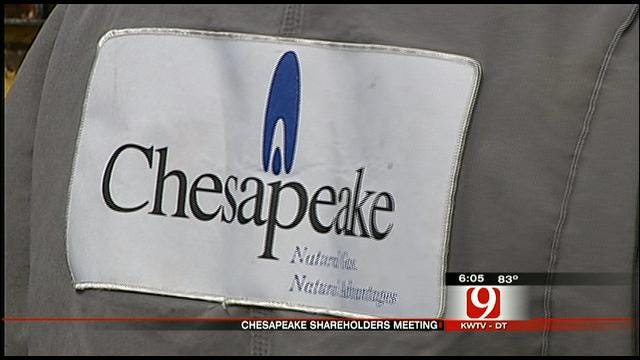Chesapeake Shareholders Cast Votes During Annual Meeting Amid Company Turmoil
Chesapeake Energy Corp. shareholders rejected the re-election of directors Burns Hargis and Richard Davidson Friday but approved five of the other proposals at the company's annual meeting.Friday, June 8th 2012, 9:59 am
By Alex Cameron and Jeff Raymond, Oklahoma Impact Team
OKLAHOMA CITY -- Chesapeake Energy Corp. shareholders rejected the re-election of directors Burns Hargis and Richard Davidson Friday but approved five of the other proposals at the company's annual meeting.
Fewer than 27 percent of voting shareholders sought to retain the two directors, who were up for additional three-year terms. However, the meaning of the vote is unclear because no directors ran against them and Chesapeake announced Monday that four directors would be replaced. The company has not announced the names of the four outgoing directors. Chesapeake's bylaws require directors who do not receive a majority of votes to step down. However, the board does not have to accept the resignations.
"Chesapeake appreciates shareholder feedback and will act appropriately with regard to the matters voted on today. Chesapeake has recently taken important actions to enhance corporate governance and increase management oversight by, among other things, reconstituting the Board of Directors," the company commented in a news release.
Chesapeake also noted it would "take the necessary actions" to allow shareholders to vote on the entire board of directors at the 2013 annual meeting.
Preliminary Voting Results From Annual Shareholder Meeting
In a statement, New York State Comptroller Thomas DiNapoli, whose retirement fund owns $57.2 million in Chesapeake stock, hailed the vote to replace Hargis and Davidson.
"Today's voting results are a rebuke to the failed leadership of the board of directors of Chesapeake Energy," DiNapoli said, describing the vote as "decisive" and calling on remaining board members to accept their resignations. "The days of an entrenched and unaccountable board structure at Chesapeake must be numbered," he said.
Shareholders approved proposals to reincorporate in Delaware, change the long-term stock incentive plan for employees and relax the supermajority voting standard for items before the board of directors. Shareholders rejected proposals to change the company's executive compensation and annual incentive plans, and require greater disclosure of lobbying and political spending.
Denver resident Gerald Armstrong said many things have happened since he filed the reincorporation proposal Jan. 11, but "little has been concluded." Armstrong has offered the proposal in the past, most recently in 2009, when shareholders approved it. The board of directors declined to implement it, however.
"Accountability is what it's all about, and it's time for a change," he said.
Tulsa resident Julie Scott argued for greater disclosure of Chesapeake's spending on lobbying and political activities, such as membership in the American Legislative Exchange Council, or ALEC.
Chesapeake spent $2.77 million in 2010 on federal lobbying, but there is not sufficient information about the company's spending at the state level, she said.
Proposals
No. 1: Election of directors Burns Hargis and Richard Davidson: Rejected
Hargis received 26 percent of votes cast. Davidson received 27 percent of votes cast.
No. 2: Majority voting in director elections: Rejected
Although the proposal received 97 percent of votes cast, this represented only 64 percent of outstanding shares. As such, the vote did not reach the two-thirds threshold required for approval. However, the board has adopted majority voting for bylaws, the company announced in a news release.
No. 3: Executive compensation: Rejected
Twenty percent of voting shareholders voted to change the company's executive compensation plan.
No. 4: Long-term incentive plan: Passed
Eight-six percent of voting shareholders voted to approve changes to the long-term incentive plan.
No. 5: Annual incentive plan: Rejected
Thirty-one percent of voting shareholders voted to approve changes to the annual incentive plan.
No. 6: Approval of accounting firm: Passed
Ninety-three percent of voting shareholders voted to retain the company's accounting firm
No. 7: Reincorporation in Delaware: Passed
Fifty-three percent of voting shareholders voted to reincorporate Chesapeake in Delaware.
No. 8: Political expenditure disclosure: Rejected
Thirty-six percent of voting shareholders voted to approve greater disclosure of lobbying and political expenditures.
No. 9: Supermajority changes: Passed
Eighty-six percent of voting shareholders approved relaxing the supermajority voting standard for bylaw changes
No. 10: Proxy access changes: Passed
Sixty percent of voting shareholders voted to change rules regarding proxy access.
Read Chesapeake's Proxy Statement
More Like This
March 22nd, 2024
March 14th, 2024
February 9th, 2024
Top Headlines
April 18th, 2024
April 18th, 2024











